As the news rolls in and in from Gaza, I’m finding it increasingly hard to read the stories without tears welling up (and this from the girl that didn’t so much as flinch when Bambi’s mother bought it).
This piece on the BBC documents the reactions of West Bank Palestinians as they too watch the events unfurl.
Violence breeds violence; be it the direct aggressions of belligerent incursions, militant rocket sorties and flighter plane bombing sprees, or the more subtle violence of strangulating blockades.
I passionately believe in non-violent resolutions, but right now, if I were there, if I had a stone in my hand, would I throw it?
Palestinian lawmaker Hanan Ashrawi says of the possibility of a third intifada:
"It's a response, a reaction to being on the receiving end of such unbridled violence,"
"There are many people who are reacting in a visceral way and saying we want revenge - it's unleashing a whole new cycle and escalating the spiral of violence."
A mother, Jamila Mohamad, speaks:
"Yesterday I was crying all day. I feel like they are all my sons. I am with nobody, not Fatah or Hamas. I just want peace."
Wednesday, December 31, 2008
Gaza
Monday, December 29, 2008
Surreal Christmas
One of the following surreal incidents did not form part of my Christmas day, can you guess which?
- Having my father suggest we didn't take our presents over to where we were spending Christmas day, but instead save them for Boxing Day on the basis "we'll only have to bring them back here
- Watching my brother dress-up as Noel Edmunds (fake beard and hideous shirt etc) and lead a game of Deal or No Deal in front of about 300 people.
- Spectating as my father and brother partook in a fascinating game of who pays for the turkey. Greatly amused as the winner (the older generation) then attempts to remain gracious on discovering the gargantuan proportions of the turkey his offspring has purchased.
- Trying not to guffaw too loudly as animal-loving aunt and owner of new rescue feline remarks mid-afternoon “ooh let me get my camera, so I can show you all photos of my pussy”. Reflect that perhaps they brought the wrong baby home from the hospital, on realising that not a single eyebrow was raised in my entire family at the above comment.
- Feeling for my dear sis-in-law as she discovered that the older generations request to see the Queen’s Speech, was not ironic.
Ok, I'll confess. There is no odd one out, they all happened.
Sunday, December 28, 2008
Christmas 2008

Christmas passed pleasantly enough (a couple of days at my parents and then my brother and sister in-law did the honours for Christmas day), but I spent most of the short break, trying to ignore feelings of utter exhaustion and vague flu-like achings.
Is it just celebrities that get to enjoy a nice week or two at the Priory due to exhaustion?
Hey-ho, back to work tomorrow…a mountain of urgent stuff awaits me…
Thursday, December 25, 2008
Christmas - where it all started
Our time spent in Bethlehem brings a new nuance to all thoughts of the nativity story.
Fittingly some of my fellow travellers have pieced together some bits of audio recorded on our trip, and with photos added and a narration by the lovely Paul, a podcast has been created.
Enhanced Christmas 2008 Greenbelt Podcast from Greenbelt Festival on Vimeo.
For better audio versions (mp3), transcripts, more details etc, click here.
A short snippet of Amos Trust's DVD about Bethlehem can be found below:
And if you fancy helping secure a playground for the kids of Beit Sahour, you can donate here.
Tuesday, December 23, 2008
Parcel

There are two sorts of people who notoriously tend to use the network of cut-through paths that link -up our little estate and the vast waste ground beyond, robbing scallies capitalising on the quick get-away created, or hardy dog-walkers.
Fortunately the caller at my door today proved to be from the former not the latter.
“Ooh I’m glad I’ve caught you in” she said “I have a parcel for you”.
It seems that she happened to be passing with her hound a few days previous, when the post office were attempting to deliver a largish parcel to my house.
I’m not entirely sure that delivery personnel are supposed to leave private mail with random strangers that live several streets away, but happen to be passing at the time.
Thank goodness she was honest, they hadn’t so much as put a card through my door, so I wouldn’t have even know the parcel existed!
So here’s to honest dog-walkers and lovely senders of gifts called Sally – it looks very intriguing….do I have to wait until Christmas?
Saturday, December 20, 2008
Monday, December 15, 2008
Standards

A supposed friend recently referred to me as "1iz - the person Russell Brand goes to for appropriateness training", but this is a little unfair I do know we have to sometimes draw the line somewhere.
It may just be that the criteria that I prioritise don't always align with social mores.
But standards are important, and it's on just such a matter that I now feel compelled to speak out.
It may come as a huge shock to no one, but I don't tend to tune in to X-factor and the like (yes I know my televisual standards are low, but we all have a limit and a show that drives music to the lowest common denominator is just too painful for the music lover/snob that lies within me).
However a couple of weeks ago, a post curry chillax chez Dog Collars and Rabbit Corpses encompassed the showing of the X-factor show recorded from earlier in the evening. This was then supplemented this last weekend, when I happened upon the closing half of the final.
I'm sure the winner is a very lovely person (though I swear the look in Beyonce's eyes screamed "get me a restraining order!") and possibly she can belt out a reasonable enough tune (the vocal mix was generally so low on all the acts I've observed, as to suggest that the priority for judgement was more about 'performance' than musicality/talent), but I nearly joined her in the copious weaping, when they announced that her first single was to be a cover of Hallelujah.
Look, I'm generally a live and let live kinda girl, but there are some places in life where one just doesn't go (voting tory, buying the Daily Mail, socks with sandals, celery etc) and I'm sorry, but X-factor treatment of a classic like Hallelujah is just wrong. In the word's of the Republican's at the time of the Spanish Civil War - if we tolerate this, our children will be next.
Random vibrato and vocal twiddling is not a substitute for demonstrating at least a passing understanding of the emotional depth and richness of the piece.
To say her rendition dumbed down the affair is a major understatement; it was a bit like watching a trained chihuahua attempting to bring emotional gravitas to Hamlet's soliloque.
It'll be enough to turn Leonard Cohen into a right grumpy, old bugger... ;-)
So let us give thanks for Peter Kay. His wit may not be razor sharp, nor his satire sophisticated, but his spoof of X-factor style shows (Britain’s Got The Pop Factor And Possibly A New Celebrity Jesus Christ Soapstar Superstar Strictly On Ice) contains some crackingly well observed elements and is oh so timely.
So if you want to buy a Christmas single, buy "Geraldine McQueen's" comedy offering (yes you'll probably deride it in years to come, but you'll still manage to show your face in public); or invest in a quality version of Hallelujah (I'm a popularist really - I'd agree that Jeff Buckley's is pretty definitive, but other quality versions are available), but for the love of all that is holy don't buy the X-factorisation (the opening 3 lines alone may cause a fatal reaction on irony grounds).
Stand firm Britain. Don't buy it. Don't speak to those who buy it.
Fin.
Thursday, December 11, 2008
That Cafe - Book Group Christmas Meal

The Book Group enjoyed a rather fine meal this evening at the ever wonderful That Cafe (we also vaguely attempted to discuss Carl Hiaasen's Basketcase).
Lots of yummy food, but sadly work pressures meant I had to drive and so no drinking for yours truly. Bah humbug!
The venison was heavenly however, and my dessert of "toffee, hazel nut cream meringue with chocolate sauce" was unimaginably glorious (far surpassing its simple description).
Friday, December 05, 2008
Wednesday, December 03, 2008
Silver Linings
An external training course (complete with exams to be passed) can't be postponed again, so there's nothing for it but to take a three days out. Always interesting to listen to the internal head of a given subject tell an external party what we do. We were fascinated.
Lot's to get sorted when I get back to the home office it seems.
With the motorway having been closed for much of the day, the traffic is only just starting to recover when we finish. It seems pointless to join the queues, so I decide to sit it out with a little bit of Christmas Shopping at a local retail park.
I promise I did get some presents, but a pair of cerise heels may also have called my name...
And it meant by the time I hit the motorway, the lanes were clear and my feet were happy.
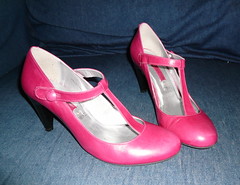
Saturday, November 29, 2008
Consultation
We're in a state of shock, when we discover that last year's redecoration has now been supplemented with new chairs and tables.
All very smart, but excuse me, where was the memo?
Thursday, October 30, 2008
Normal Service

Well I did warn you.
My thoughts about it all are still very jumbled, but writing about it has helped a little.
My head will continue to spin as I try to work out what to do with everything I brought home with me, but fair reader, you will be spared any further pain...normal service will now be resumed.
New shoes. Curry. Gigs. That kind of nonsense.
Wednesday, October 29, 2008
An Introduction
My reasons have general been centred around a desire to write for my own personal pleasure and purposes (a journal in a format that works for me), with a side order of allowing/acknowledging an audience of friends and associates in the realm of keeping in touch with a friendship circle that spans multiple counties and countries.
Usually the decision of what to and what not to blog is relatively straightforward, but right now I'm struggling. The cause of the struggle? A week spent in Palestine.
A week that leaves me with emotions and thoughts tumbling out one upon another; experiences and reflections I want to capture, deconstruct, consider, challenge and ultimately absorb.
Writing is one of my turn-to tools for getting my head straight about things, but right now I'm not entirely sure it's a process best undertaken in the public glare.
It’s certainly unlikely to not make the most interesting of reading to third parties, so as I get round to posting entries from last week, don’t feel obliged to read.
More than ever, it really is more about me than you ;-)
Or, you know, maybe just look at the pictures...
Saturday, October 25, 2008
Tel Aviv - London – Manchester
We’d been warned they’d likely pull out one of the younger, smaller looking members of our group for questioning and check their answers matched our group leader’s.
That’s the trouble with such blunt profiling, they pull B, the actor.
On the plane I wish I could sleep, but as ever it eludes me.
Back in Blighty I seem to flip back to UK mode without missing a beat as Stuart and I find our Oyster cards and catch the bus to my folk’s place.
After a less than restful night on a dodgy camp bed (I kindly let Stuart have my bedroom), I spend a morning chatting to my folks and already I see how it’s hard to relay what we’ve seen in a way that makes sense.
Stuart eventually surfaces (his phone had doubled up on his efficient end of summertime adjustments, leaving him an hour out) and we catch the train and tube across London and settle into our train seats at Euston ready for the last haul home.
Stuart looks at me and says “we’ve been travelling for over 30 hours”.
I’m ready for home.
At the end...

After seven amazing days in this land, it’s time to pack our bags and start our journey home.
En route to Tel Aviv we pass by the ruins of Megiddo, more famously known as Armageddon, supposed site of the final battle.
Besides a motorway junction and a large prison there’s not a great deal to see from the road.
There is however, a drive-thru McDonald’s. I leave readers to make their own jokes about catering at the end times etc.
Friday, October 24, 2008
Tiberius - Mount of the Beatitudes, Mensa Christi, Sea of Galilee
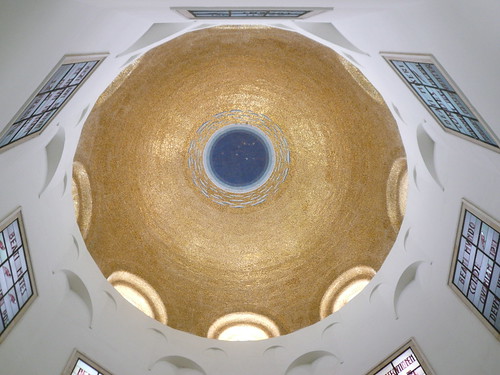
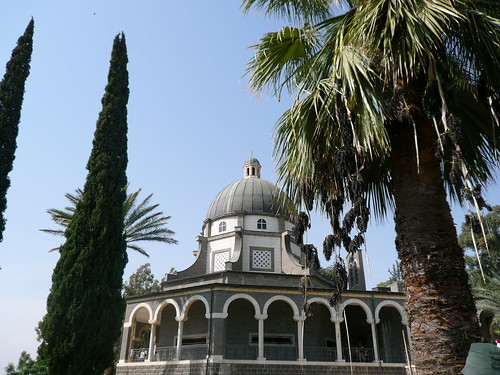
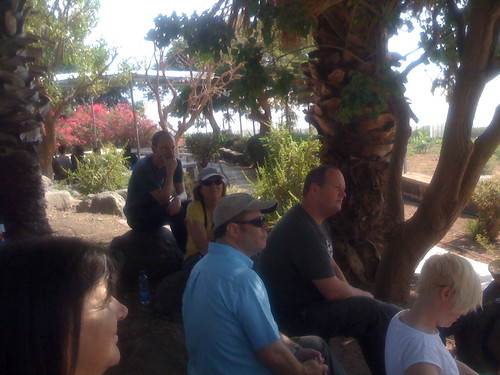
First visit of the day is the Mount of Beatitudes, where a local pastor leads our meditation as we perch on rocks in the beautiful grounds of an impressive church, ruled by angry nuns.
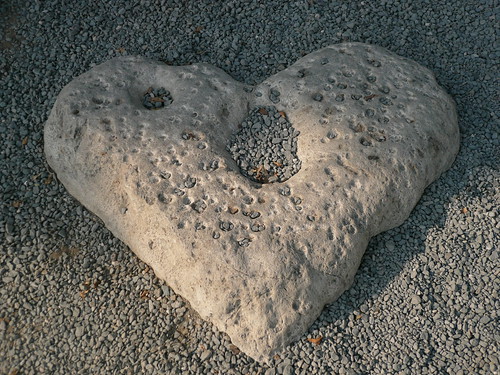
Then to the Church of the Apostles where we picnic looking out over the lake. It might have been more fitting to have lunched at Mensa Christi, where Jesus shared the spoils of the disciples catch, however large signs instruct that modern day visitors are forbidden from following suit.
I don’t think I’m the only one suffering ‘church-fatigue’ and when the choice is given of one more visit or the option to return to the Pilgerhaus to spend the rest of the afternoon by (and in) the Sea of Galilee, the group is in unison.
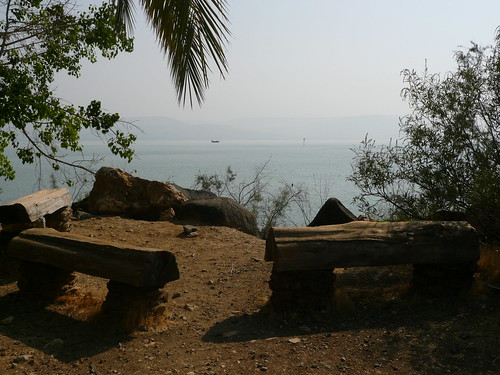
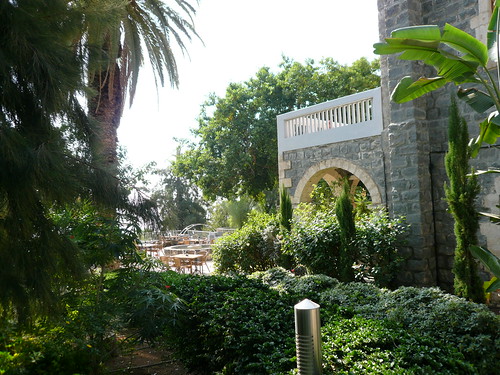
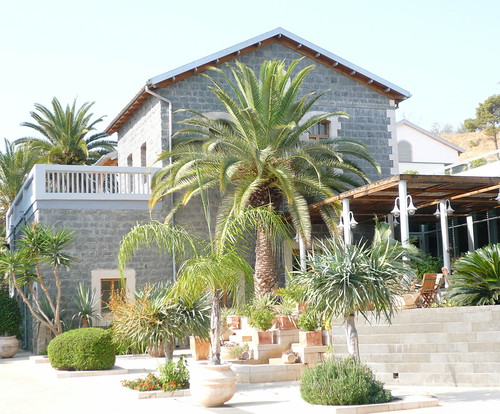
Having spent the week at a pace, packing it all in, running where Christ walked, it’s biss to kick back and relax. Donning swimwear we head to the rocky beach in front of the guesthouse and paddle, swim and float where Christ walked (that whole hovering on water thing wasn’t really working for us).
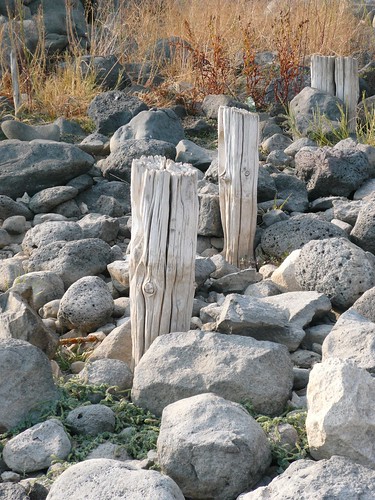
Galilee is truly beautiful, with amazing views over to the Golan Heights.
It’s actually a lake rather than a sea, but the lack of salt in the water is more than compensated for by its green colour. Such murkiness is easy to forgive however, when you look out over the water to such refreshingly unspoilt scenery.

You just need to watch out for the Hyrax – strange rodent creatures, they reportedly spat at one of our group that attempted to get close. Then again the same party was also crapped on by a bird at Dominus Flevit, so it could just be that he’s at war with the natural world...
Thursday, October 23, 2008
Synagogue Church, Church of the Annunciation and Mahroum’s Cake Shop
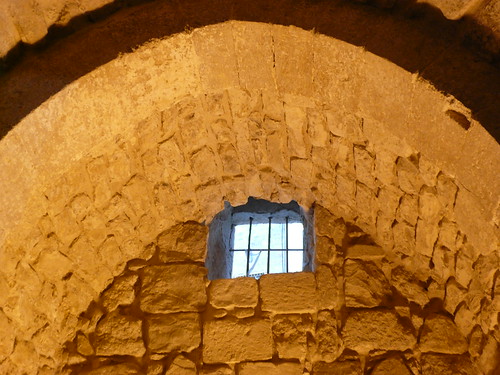
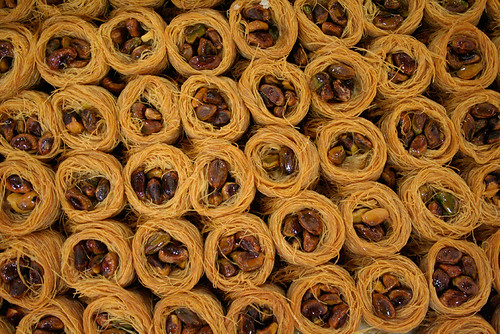
Before we leave Nazareth a chance for a bit of sight-seeing including, below the Church of the Annunciation, the remains of what is historically regarded to be Mary’s home.
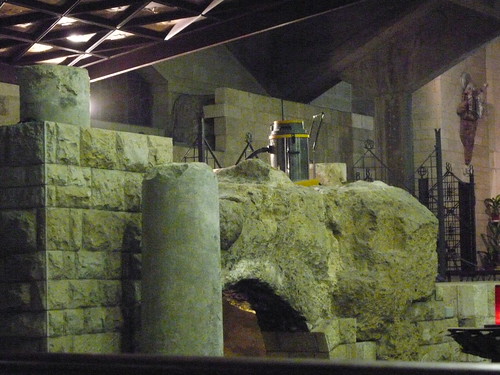
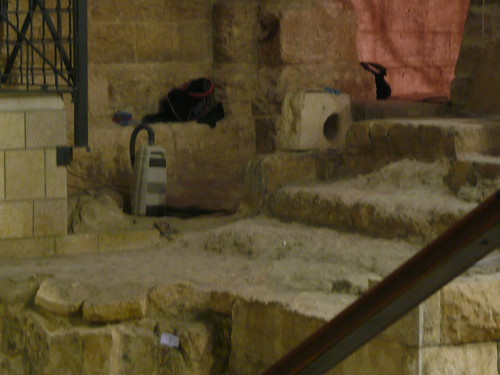
With not one, but two vacuum cleaners in evidence one can only conclude that she was very house proud...
Jericho and Nazereth
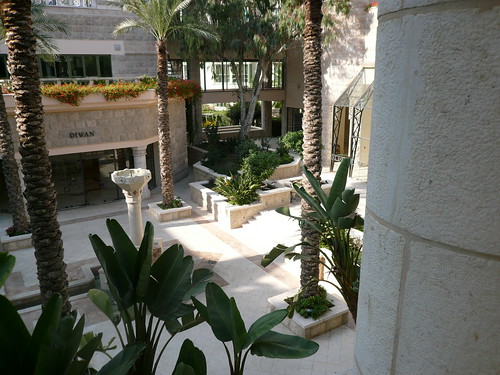
After a night of music arranged by A and W, we pack up our bags and leave our base of the last five days, the beautiful Jacir Palace Hotel (I recommend it highly) and head east close to the Dead Sea and then north via Jericho to Nazareth.
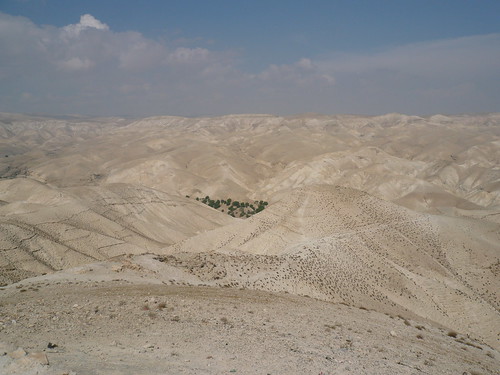
Between the sightseeing we meet with the Arab Association for Human Rights and we consider the lives of the Palestinians who within Israeli territory as full Israeli citizens.
Inequity occurs at numerous levels, direct legal double standards are compounded by indirect, systematic discrimination, which removes rights and benefits.
The talk also helps me explore a question that has been steadily growing in my mind; is a democratic nation state defined by ethnicity/religion, inherently problematic?
Its existence relies on a constant consideration of demographics; the majority must be maintained.
From this basic need comes deeply unsettling policy. Deny right to return to refugees from the other people group who were forced from their land in the last 60 years, in favour of conferring the automatic right of immigration to anyone from your people group. Seize and settle land; choose your settlement locations such that they change the demographic balance in an area. Keep an eye on the reproductive rates. Withhold citizenship, deny people the right to start a family in their homeland and so on and so on.
Buzzwords like ‘demographics’ and ‘population transfer’ appear to be moving from the margins of the political extreme to the mainstream and they take on a very foreboding air.
And yet I want to say that I understand the need for a Jewish homeland. How is that possible without the outworkings like the above? How can this circle be squared?
I don’t know what the answer is, but from everything I’m seeing, I’m pretty sure it’s not this.
Wednesday, October 22, 2008
Hope
He tells us that the last thing that Palestine needs is more politicians, more religion, more tales of the victim; instead he talks of small steps, positive increments a small politics with a little p.
It’s inspirational, it’s people sized, people-centric and it’s the closest to hope I’ve seen all this while.
It’s easy in this land to start feeling very negatively about religion and the role it undoubtedly plays in the problems. But something in what Mi*tri says gives hope even in this, as he talks of a faith that speaks about the giving up of power, of strength in weakness.
Handala
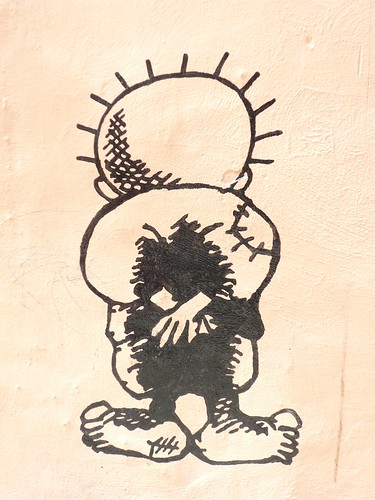
One image appears again and again on walls and buildings. A small boy, barefoot and in ragged clothes, stands with his back to the viewer, his hands clasped behind his back.
Drawn by the artist Naji al-Ali, the figure represents a Palestinian refugee child aged ten (the age al-Ali was when his family fled to Lebannon).
Named Handala, the boy became al-Ali’s signature and over time an adopted symbol for Palestinian refugees.
Handala stands excluded from his homeland, a tough kid, age frozen from the time he left his village until the day he might one day return. He turns his back on the Arab states who he perceives have failed to help him in his hour of need and his hands are clasped refusing to accept the external “American Way” solutions thrust at him.
Small, but never turning, Handala will stand resolutely thus, until he one day returns home.
Deheishe Refugee Camp and IBDAA Cultural Centre
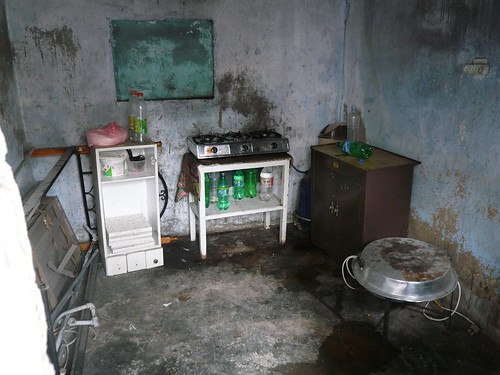
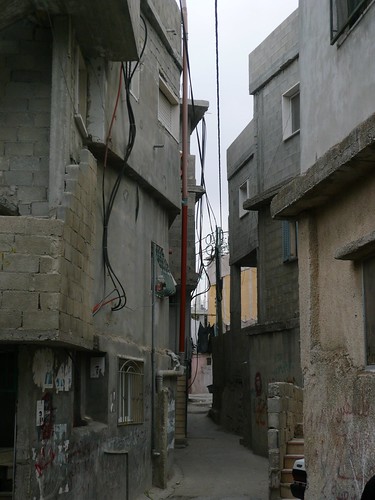
Leaving Efr@ta we head on to Deheishe refugee camp.
Entering a refugee camp that has been in existence for 60 years now, is a very sobering experience.
But here within the narrow lanes that weave amongst the makeshift housing that is half temporary, half permanent, there are brief glimpses of colour to be found amongst the concrete and dust.

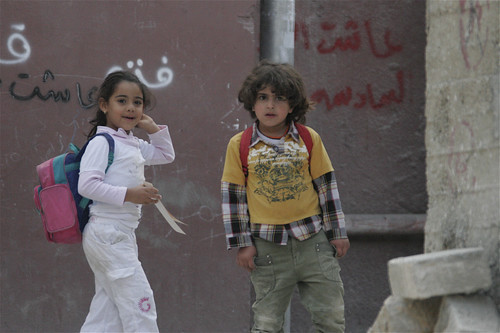
Children play with a balloon.
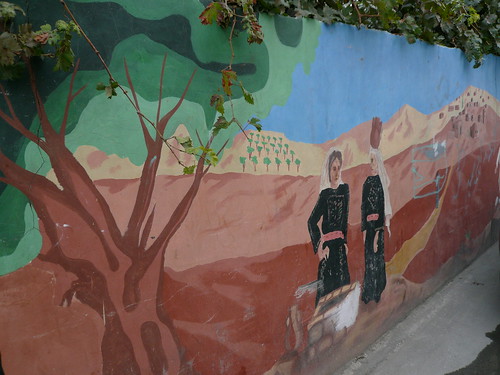
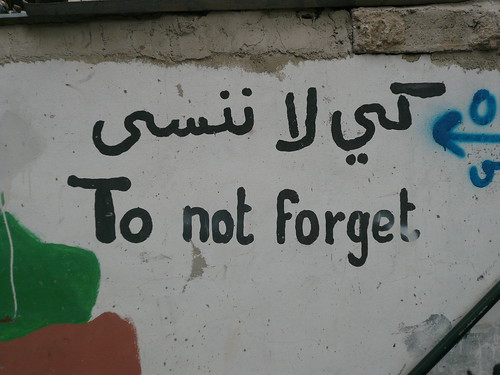
Paintings of long left villages and homes adorn building walls; not to be forgotten.

A cultural centre whose name reflects its determination to build something out of nothing.
Efrata - The Other Side
I’m very aware that there is a real danger of only hearing one side of things, so I’m really pleased that this morning we’re off to a settlement to meet a settler and hear his side of the story.
The previous settlement, Ma'ale Adumim, which we had visited en route to Beit Arabia, was something akin to Milton Keynes and our Israeli guide had told us that for most people living there, although the town had been built within the occupied Palestinian Territory, the motivation was financial and aspirational rather than political or ideological. Nice housing, zero percent mortgages, good schools and excellent civic amenities providing inducements of a better life for you and your family.
AG our host explains how for his family and his neighbours in the Orthodox settlement of Efr@ta, the motivation is far more cognitively about a Zionist dream and a clear belief that the Jewish people have a claim to the land.
Born and brought up in the US, AG and his wife moved out to Israel around 26 years ago and took a deliberate decision to live in an Israeli settlement within the Occupied (or as he puts it “Disputed”) Territories. He self-describes as religiously observant and politically centre-right, not an extremist by any stretch, but a definite supporter of the claim of a right to a Jewish state stretching from the Mediterranean Sea to the Jordan River. He serves as some sort of spokesman, designated to speak to groups like ours.
It was a privilege to be welcomed into the synagogue and to hear him speak of his passion for the Jewish state and his dream. Clearly he felt a deep, deep ‘right’ to the land, stretching back 2000 years and I wish he would have elaborated and expanded on that more, rather than concentrate rather on citing his reasons for rejecting the Palestinian counter-claims (it was a bit like listening to an opposition party politician that can only rubbish the government’s policies, rather than set-out their own policies).
What was clear though was that given his intent to dwell in the land, security was his biggest concern and it is perhaps too easy to underestimate the impact waves of terrorist attacks have had.
He spoke about how in the past he and other settlers had attempted meetings with local Palestinians in an attempt to work on how they could live alongside each other. Apparently these meetings ceased when the Palestinians felt unable to host alternate meetings on their ‘home turf’ as they couldn’t guarantee safety for the settlers. You could see how deep this issue went as AG forceable emphasised this issue “see that’s ultimately the issue, ‘they’ can’t guarantee our security”.
Similarly, he told us that he had in past years had what he considered a Palestinian friend, a car dealer, who he bought his cars from. It transpired that the relationship had floundered as the divisions between the two societies here were formally increased and that now the situation was such that he and other settlers had very, very little interaction with any Palestinians.
It always seems to me that when two camps are in conflict with each other, it is far harder for any individual in one to camp to paint the “others” as “monsters” (either way), if there are personal relationships that challenge that mindset. It’s harder to maintain the cognitive dissonance of “those people” are inherently bad, deviant, dangerous, stupid if you play in the schoolyard, sit alongside in the café, work at the next-door workstation, buy papers at the same newsagents, smoke outside the same doorways, wash clothes in the same launderette etc.
The current reality is that these relationships are now impossible and I can’t help feeling that much hope is lost as a result.
AG asserts that “I accept of course that not all Palestinians are terrorists, but at the same time all terrorists are Palestinians”.
Presumably Baruch Goldstein who opened fire in the Ibrihimi Mosque in Hebron, killing 29 Arab Muslims and wounding 150 more, is what? A freedom fighter?
And this is the fundamental problem, I’ve done enough reading, seen enough, heard enough to be able to pick hole after hole in his arguments.
The logic he does come up with is thin, even petty at times and ultimately I fear it does little to convince any of us of his cause.
I’m frustrated. I want to hear both sides. Is this the best counter-argument there is?
Tuesday, October 21, 2008
Open the Roads

The evening is spent in the shadow of the wall, at Carmen’s Restaurant, where we share a meal with folk from the Wi’am Conflict Resolution Centre.
At our table are two local school girls who attend the Wi’am Youth Group.
It’s excellent getting to know them, both shine with the brightness of youth and are full of promise. Da tells me she doesn’t know the word for what she wants to be when she grows up…but it’s like on the TV show CSI…so I guess we’re talking forensic scientist or pathologist. It’s kind of mad though, in our broken exchanges divided by language, Hollywood has provided us a common language.
Di knows the general word for what she wants to be, Eng1neer, but doesn’t know the word for the particular discipline…she explains, buildings, dams, roads etc and so I find a kindred spirit!
As the meal ends, the youngsters are called forward to perform some dances, it’s fabulous to see them interacting as teenagers the world over. Change the language and the music and you could be watching the youth group of any British town laughing as they push each other into the limelight and managing a few minutes of co-ordinated performance before it disintegrates into fits of giggles.
In the absence of our ability to return the favour through any form of communal British dancing (the okey-cokey maybe? Or Agadoo? A quick conga? Never has our culture seemed so barren), fortunately we are saved by a couple of musicians in our group doing the honours.
It was so excellent to meet Da and Di; they strike me as excellent young women and you can see their potential. Sadly however they tell me that in order to follow their dreams they would need to leave Palestine to be able to study and work.
It’s a horrible echo of all the years I spent doing youth work a very deprived estate in Manchester: anyone who was able to make it through the system and fulfil their potential, anyone that could, left. The phenomena leaves behind a society bereft of some of its brightest stars and all that they can contribute to the community.
We play the game of “if you were ruler of the world tomorrow what would be the first thing you’d change”. Di (clearly a budding civi1 eng1neer indeed) considers carefully and replies “bring development into Palestine”. Da’s response is more immediate and clearly heartfelt, she simply says “open the roads”.
As we make to leave it seems sad to have met this fine youngsters and then have to cut and run. Suddenly Da enquires “Facebook?”. Scribbled notes are exchanged and new friendships are cemented in the way of the cyber generation.
Desert
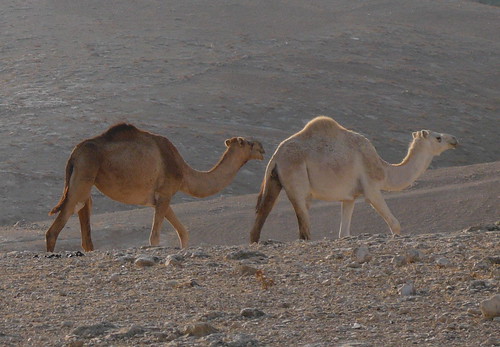
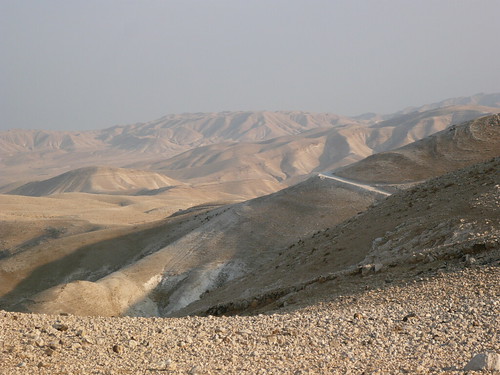
After lunch, we travel out to the edge of the Judean desert in search of a little of that wilderness experience and sit on the dust and stones for a time of reflection led by a guy called S@mi.
I’d love to tell you more about it all, but frankly I was a little distracted by trying desperately not to react as small local boys attempted to lure the tourist dollar from us via offers of trinkets for sale “my mother took three days to make this”.
Initially they’d respected W’s request that they give us space until we’re finished and then they could attempt to ply their trade, but clearly we’re taking too long and patience is failing and donkeys have been fetched as an added inducement, with whispered suggestions of “you ride? you ride?”.
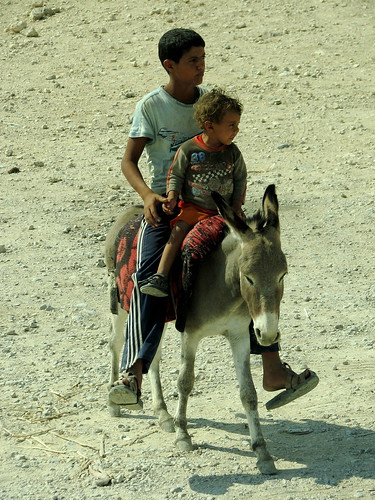
It’s incredibly hard to ignore a donkey snuffling around your foot as its ears brush your legs, but this is a battle of wills and it’s clear that the merest hint of reaction or eye contact and all will be lost.
Manger Square
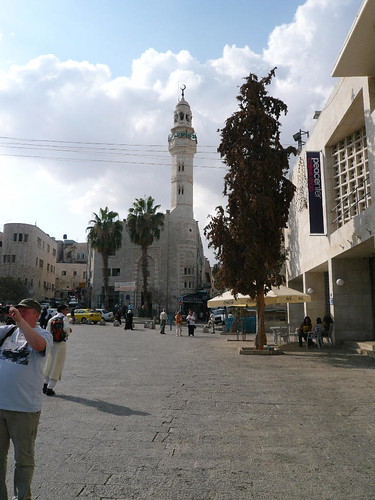
In a well needed let up from the pace, we have a bit of time in Bethlehem, to wander around Manger Square (which appears to be hosting a local version of Dance Idol) and get some lunch.
Stuart, G (my most excellent room mate for this trip) and I potter about and start chatting to the owner of a small souvenir shop (we laughingly agree to his proposed deal that we look around his shop in exchange for a recommendation of somewhere quiet to grab some lunch).
As we chat and ask questions, our new acquaintance opens up, sharing a little of his life and how business is being devastated by the wall.
So if you ever happen to be in Bethlehem and in the market for some beautifully carved olive wood items or finest ceramics, cross Manger Square away from the Church of the Nativity, go back one road and suss out St John’s Souvenirs. As well as some of the friendliest service you could hope for, he’s also to be listened to if you want to find a hidden little cave like café serving very yummy and reasonably priced schwarma wraps*.
* Unfortunately G decides to head back to the Casa Nova for lunch, where we catch up with her 45minutes later…still waiting to be served. Partly run by monks, it’s surprising they aren’t better at taking orders...
Funds

Having walked back through Hebron, I join a number of folk trying to access funds at various ATMs. Getting cash or even getting credit cards to work has been proving problematic.
Prior to travelling, I had notified my banks and credit card companies of where I will be travelling and had been told all will be fine, but I’m having no luck. In a pattern that continues for the week, it seems our Maestro, Solo, Mastercard and Visa pieces of plastic only work with any regularity in Israeli territory. Again and again, shops, hotels and ATMs in the Palestinian territories that display all the relevant logos and “usually have no problem” can’t get our cards to work.
The local explanation seems to be that our cards clear through American banks and they are now putting the squeeze on any funds getting into Palestine.
I’ll be writing to my bank and credit card companies when I return to try and find out the truth of the situation.
If the explanation is as suggested, this would seem to be a further nail in the coffin of the tourist industry in places like Bethlehem.
Surely this is counter-productive anyway. Destroying what little viable, legitimate economy remains surely only creates hothouses for people taking up the route of violence resistance? Isn’t there a little more sophisticated means of avoiding funding terrorism (which I guess is the reasoning)? And who appointed American banks as the guardians of my tourist shekel?
If I get any answers I will of course share. It is entirely possible that there’s a perfectly innocent explanation...it’s easy to see how conspiracy theories grow and thrive in this climate alongside the olives.
Hebron
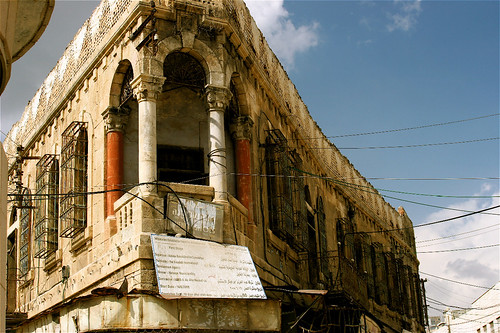
An earlier start then ever this morning as Hebron is our destination. Specifically we hope to visit the Tomb of the Patriarchs – traditionally regarded as the burial site of Abraham and Sarah, Isaac and Rebekah and Jacob and Leah.
Now you might notice something there. This appears to be the burial place of as many matriarchs as patriarchs. Hmmmmm...
Anyway (fittingly, leaving that observation as a side note in this tale)...Hebron is home to around 166,000 Palestinians and around 500 Jewish Settlers. The city currently exists in two parts, H1 and H2. In very simplistic terms, under the Hebron Protocol of 1997, the IDF withdrew from H1 and elements of powers and responsibilities (including policing of internal security and public order) were transferred to Palestinian control. Israeli forces still fully control H2 and continue to carry responsibility for the security of all Israelis in either sector (a situation which on one hand can be seen as continued control, on the other an understandable desire if you feel that security cannot otherwise be suitably guaranteed).
We alight from the coach and continue our journey on foot through the bustling streets of modern H2. As we head further into the older area the crowds thin considerably and by the time we pass into the old market that leads to the H1/H2 boundary and checkpoint, individuals are thin on the ground.
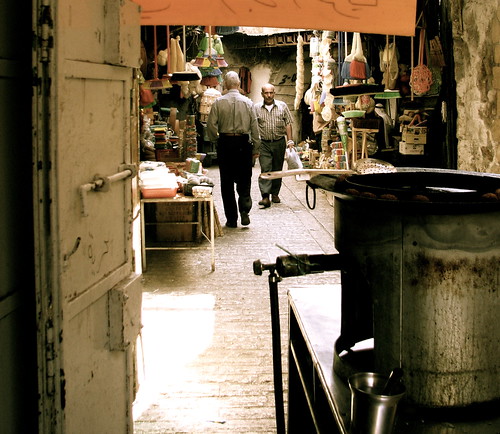
Once a thriving commercial district with the tiny shops each worth immense sums, shopkeepers tells us that now days go by without a sale.
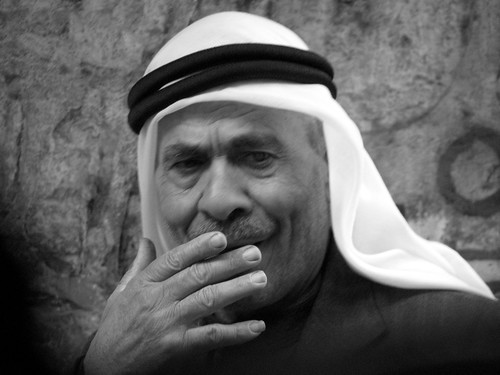
Above the ground floor shops, upper floor properties have been taken (by fair means and foul) by Israeli settlers. Israeli armed guards watch from their first floor emplacement at the mouth to the market a threatening and intimidating presence monitoring the comings and goings below.
As we walk through the narrow market lane we're aware of makeshift wire mesh errected just above head height.
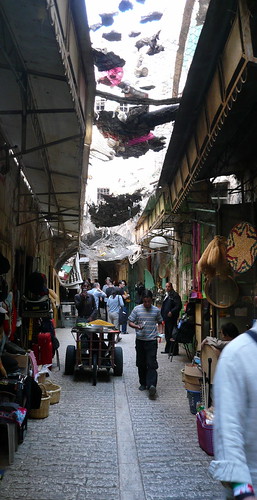
The assorted debris collecting on these depressing fishing nets, confirm what the shopkeepers tell us when we ask about the purpose of the mesh, the settlers above throw all sorts of waste matter onto the heads of the Palestinians below.
The sight of this rubbish encrusted wirework stops me in my emotional tracks. More than anything I have seen so far this appals me and at the time I'm not entirely clear why.
A fellow observer suggests it's because it goes beyond squabbles over land rights or religious differences and speaks of one people group actively treating another people group as vermin.
I think this explains a great deal of why this indignity hits me so forcefully; it's so direct and personal; so devoid of any sense of innate human sanctity. This is not a wall of concrete devised in committee room, designed on structural engineering software, realised by construction firms, secured by kids completing their national service and following orders. This is about individuals choosing to throw their personal waste matter onto the heads of other people below, in an act of unfathomable intimidation and degradation.
If this were not explanation enough for the lack of business these days, the lane finishes in a tunnel like facility with turnstiles, which forms the first element of the checkpoint at the H1/H2 boundary. Even with European passports in hand, the passage is intimidating (although in the final section the constant peep of the metal detector as we walk through the body scanner is systematically ignored).
Out into daylight at the other end, our progress is halted by soldiers. We stand adjacent to the Tomb of the Patriachs building (these days the larger part of which forms the Ibrihimi Mosque and the other part a Jewish synagogue), but we will not be allowed to enter or travel into H2.
With a Jewish holy day in process, the Israelis have placed the whole of H2 under military curfew for 24 hours. Palestinians are confined to their homes, whilst we watch Jewish families wander unimpeded down empty streets. I guess the argument is that the risk of terrorist action is heightened on such a day, but to effectively place so many thousands under house arrest seems a very blunt and indiscriminate security tool.
As we stand in the shadow of the building, our guides quietly tell us something of what it’s like to live in Hebron under these restrictions and something of the history.
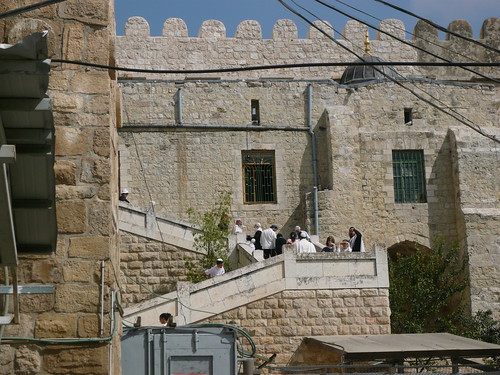
Suddenly the patience of the soldiers ends, perhaps they become aware that this strange group of sightsee-ers seem to have a lot to talk about in hushed tones as they look up at the synagogue/mosque and across to the H2 streets. A stern, urgent order is issued and we have to immediately move back into the tunnel and return to H1.
The mood of the group is notably subdued. Hebron has perhaps given us the most sobering of experiences so far. In many ways it all seems so bleak, but even here there are small signs of hope.
We meet local people working for peace and justice; a women's cooperative sells beautiful hand crafted textiles and embroidery, our guides are a South African and European volunteering with a Christian organisation providing international escorting and observatory services on the ground (helping kids get to their schools un-harassed and without in turn harassing others, escorting farmers to their olive groves at harvest time when they are prey to settler violence etc).
I wish I could say that it's the sight of finely embroidered purses that I'll take away with me, but in reality I know it's rubbish on wire mesh that will live on in my head.
Monday, October 20, 2008
Beer and smoke
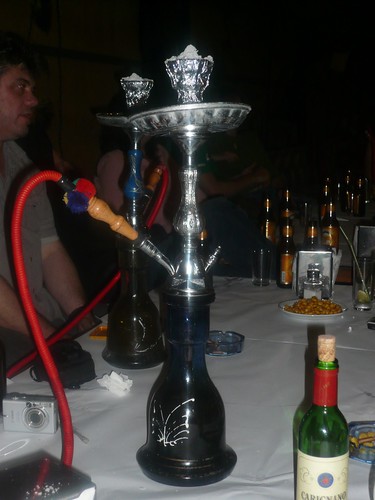
With so many thoughts circling around our heads, some time out is sorely needed and a tent bar with freely flowing beer and hookah pipes is just the ticket.
The American Colony and the Shepherd's Fields
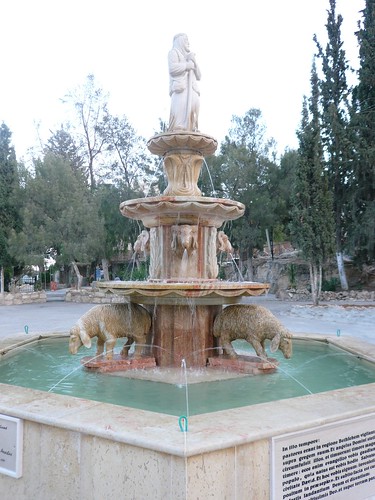
Back to Jerusalem and a quick drink at the American Colony, before heading through Bethlehem to the Shepherds' Fields. Here can be found the fine spectacle of a water fountain comprised of spitting sheep (admittedly that may not have been the look the artist was intending).
Before heading back to the hotel, we stop off at a children's playground that has been created on the edge of Beit Sahour.
It's small and simple, but it's the only such facility serving the community.

Despite being late, a small group of young kids, watched by their mothers, are playing in the dark and delight at the prospect of mad foreigners willing to spin them on roundabouts, giggle alongside them, pretend to drop dead when shot at with toy pistols and best of all show them the instant results of photograph taking (you've got to love the immediacy of digital).
In the shadows though, a threat lurks. Nearby Israeli settlers are attempting to claim the land and the future of the playground hangs by a thread.
As I wave goodbye, anger wells up inside me.
Maybe it's the fact that the simple layout and the primary colour paint work are so similar to the hard-fought for playground in my local park that is making me identify with the project so clearly. Maybe it's the confirmation that kids (young and old alike) share that universal delight of play that transcends language and background. Maybe it's after a day experiencing such enforced small living. Maybe it's the open, innocent smiles of the little uns. Whatever it is, the anger comes and the thought plays through my head again and again.
"Is it too much to ask to let some kids have a sodding playground".
Beit Arabia
Now a centre for peace, we hear from the owner who had wanted to build a home for his family. We hear how he tried again and again to make his way through the Kafka-esque process that is obtaining a building permit from the authorities of occupation. Technicality after technicality was found to reject his application, ending eventually on the laughable objection that the land in question has a slight slope.
This is commonplace it seems, from making it impossible to obtain building or renovation permits, to refusing hook up to utility services, practice after practice makes the everyday citizen an unwilling criminal. In turn this is all the justification required for policies of discrimination, intimidation, enforced collaboration and so on.
One such example is the regular practice of home demolition; around 20,000 per annum on a seemingly random basis. Wake up one-morning to find your house surrounded by army troops and bulldozers and the notification that you have 15 minutes to vacate.
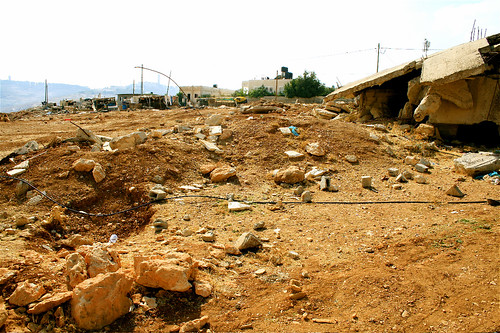
Resist or complain and you'll likely be brutally assualted and or arrested.
Survive all this and you'll not only end up homeless, but fined and charged with the legal and financial obligation to clear the rubble. The words salt and wounds spring to mind.
Listening to our host's personal story, whilst we tuck in to the most amazing lunch prepared by his wife, it's impossible not to be impressed by his desire to do things 'right', the futility of the system, and the destruction of the family that occurs alongside that of bricks and mortar.
As he talks of the ongoing impact the home demolition has had on his children, I can see the parents among our group struggling to cope.
As he tells, with the sweat of emotion pouring down his face, how his young daughter faced years later with a helicopter gunship in the distance, refused his words of comfort and reassurance with the reply that Daddy couldn't protect her, she'd seen what the soldiers did, I know what will be going Stuart's head.
We leave to reboard the coach, none of us sure what to do with our emotions.
The Thief
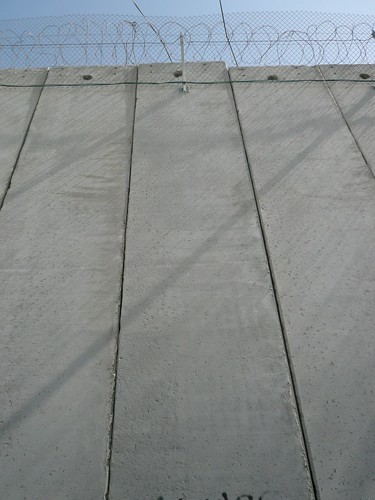
Here the divisive nature of the wall is incredible evident - a neighbourhood suddenly carved in two.
As my eyes continue to take in its reality, I understand what has moved visitors to spray their words of opposition on its imposing face. Stuart and I pose against one such inscription that reads "Mancs against the tanks".
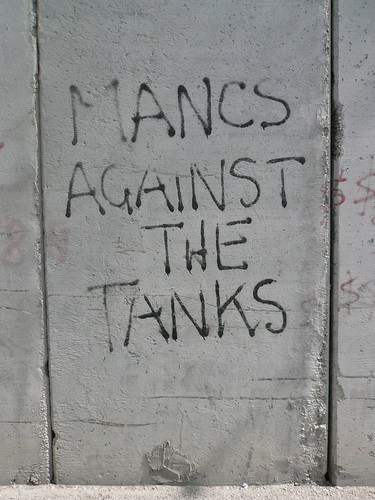
At the same time however, words of English feel like an imposition, this is not our story. It's important that we hear and see and stand alongside, but should the words of protest be in our tongue? Maybe any tongue that can be added should be added, but I wonder what the locals make of it all. As Jarvis so wryly observed - everybody hates a tourist.
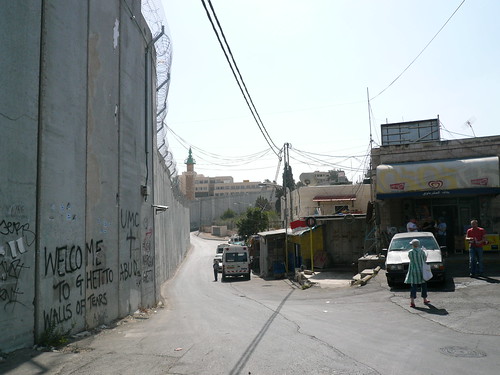
A corner shop sits dwarfed by the wall, its customer base excluded by unscaleable barrier. The owner, who also lives on the other side of the wall, tells us the wall is a thief. A thief that has stolen his life and that of his family.
There are so many words for this wall. A security barrier, a separation fence, an anti-terrorism measure, a wall of division, an instrument of land grabbing, a phyisical construction of apartheid...a thief of lives.
I stare at the wall and try to imagine what this area was like before it arrived and how it must feel to live with it in your midst overshadowing your life. I stare at the trademark shape, the wide concrete footing at the base of each panel providing the buried stabilisation, the hole 11m above enabling construction as each pre-formed panel is lifted into place. I look through the eyes of an engineer, I see the design, the thought processes. But I'll not claim this for civil engineering if you'll allow. the civil signifier originates from the concept of non-military and never has the blurring of that boundary been more troublesome. You can call this wall many things, but you can not call it civil.

